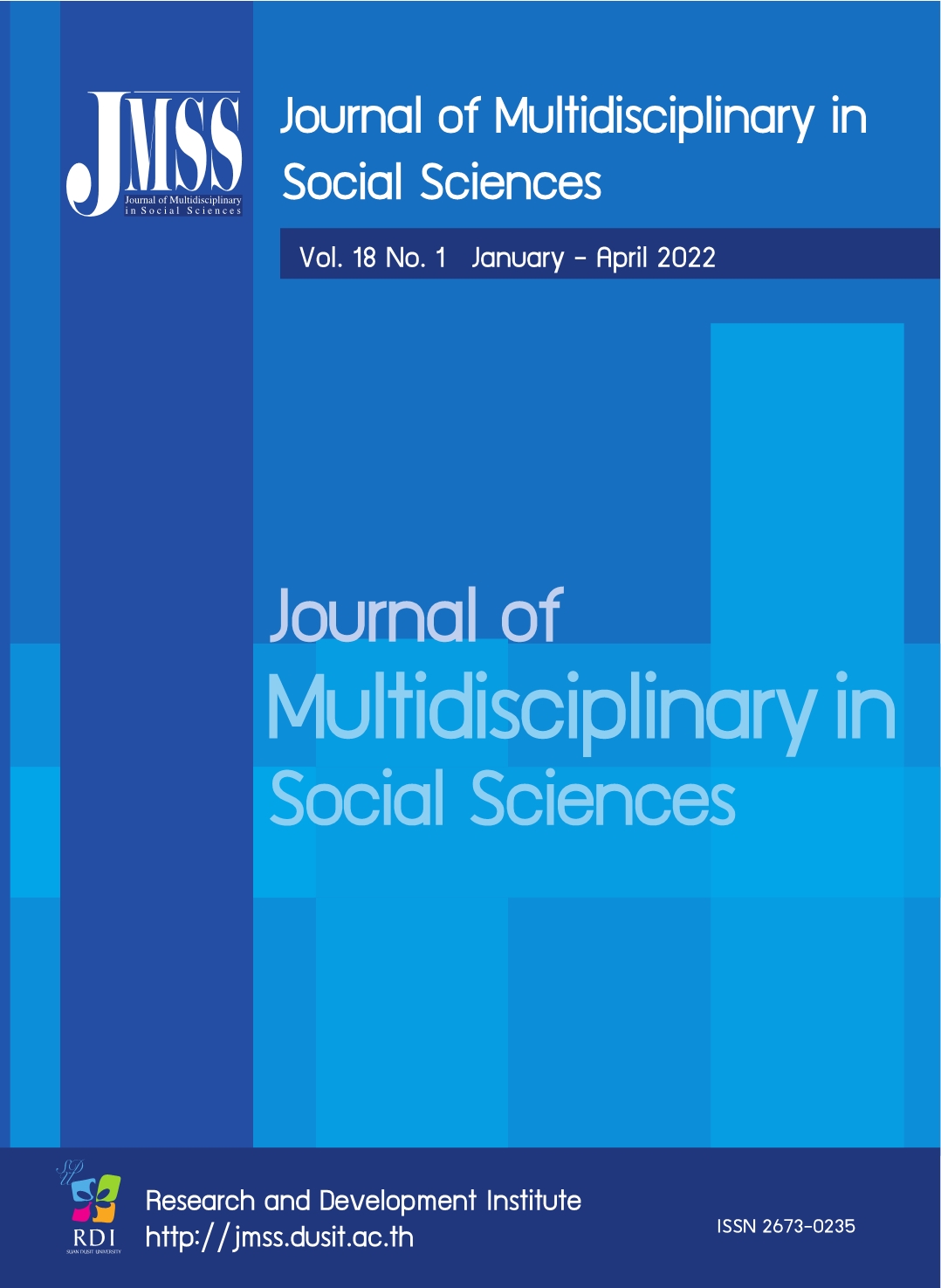Development of Home Economics Entrepreneur Indicators for Undergraduate Students
Keywords:
Home economics, Entrepreneur, Home economics entrepreneurship potentials, Higher educationAbstract
Entrepreneurship is a competency that is crucial for students of any field whose nature is different according to the context. Therefore, the current research develops Home Economics entrepreneurship and tools to be used in the analysis of Home Economics entrepreneurship for undergraduate students. The data was collected from 404 undergraduates from Faculty of Home Economics Technology of Rajamangala University of Technology Krungthep, academic year 2021 by Stratified sampling. The study was divided into two phases. Phase 1 dealt with qualitative data analysis by studying relevant documents and previous research studies as well as interviewing experts in the field, to develop Home Economics entrepreneurship indicators. After that, confirmatory factor analysis was adopted. Phase 2 was quantitative data analysis, implemented by collecting data from 304 undergraduate students by using ANOVA. The results of Phase 1 qualitative research revealed that the Home Economics entrepreneurship potential consisted of 6 components including seeking business opportunities, innovative thinking, risk taking, management, entrepreneurial intentions, and networking. The results of testing the construct validity of Home Economics entrepreneurship potential showed that the model had a comparative fit with the empirical data. Furthermore, the results of Phase 2 quantitative research revealed that students who trained in Home Economics skills for more than 21 hours per week obtained a higher average for the Home Economics entrepreneurship potentials than others with the statistical significance of .05. Those who received Home Economics awards acquired a higher average for the Home Economics entrepreneurship potentials than others with the statistical significance of .05. Students who performed Home Economics-related jobs acquired a higher average for the Home Economics entrepreneurship potentials than those who did not perform any part-time jobs or performed non-related jobs with the statistical significance of .05. Lastly, students with the genuine entrepreneurial intentions had a higher average for the Home Economics entrepreneurship potentials than those who did not with the statistical significance of .05.
References
Ahmad, N. H., Suseno, Y., Seet, P. S., Susomrith, P., & Rashid, Z. (2018). Entrepreneurial competencies and firm performance in emerging economies: A study of women entrepreneurs in Malaysia. In Knowledge, learning and innovation (5-26). Springer,
Cham. Baron, R. A. (2006). Opportunity recognition as pattern recognition: How entrepreneurs “connect the dots” to identify new business opportunities. Academy of management perspectives, 20(1), 104-119.
Chibuzor, A. N. (2014). Enhancing creativity in entrepreneurship through home economics education in Nigeria. American international journal of contemporary research, 4(6), 104-107.
Cohen, J. (1988). Statistical Power Analysis for the Behavioral Sciences. New York: Routledge Academic.
Cruz-Ros, S., Garzon, D., & Mas-Tur, A. (2017). Entrepreneurial competencies and motivations to enhance marketing innovation in Europe. Psychology & Marketing, 34(11), 1031-1038.
Edokpolor, J. E., & Somorin, K. (2017). Entrepreneurship education programme and its influence in developing entrepreneurship key competencies among undergraduate students. Problems of Education in the 21st Century, 75(2), 144.
González-López, M. J., Pérez-López, M. C., & RodríguezAriza, L. (2021). From potential to early nascent entrepreneurship: the role of entrepreneurial competencies. International Entrepreneurship and Management Journal, 17(3), 1387-1417.
Hasan, M., Guampe, F. A., & Maruf, M. I. (2019). Entrepreneurship learning, positive psychological capital and entrepreneur competence of students: a research study. Entrepreneurship and Sustainability Issues, 7(1), 425.
Karimi, S., Biemans, H. J., Lans, T., Mulder, M., & Chizari, M. (2012). The role of entrepreneurship education in developing students’ entrepreneurial intentions. Retrieved August 1, 2020, from https://papers.ssrn.com/sol3/papers.cfm?abstract_id=2152944
Kanjanawasee, S. (2005). Classical Test Theory (7th ed.). Bangkok: Chulalongkorn University Press.
Man, T. W., Lau, T., & Chan, K. F. (2002). The competitiveness of small and medium enterprises: A conceptualization with focus on entrepreneurial competencies. Journal of business venturing, 17(2), 123-142.
Man, T. W., Lau, T., & Snape, E. (2008). Entrepreneurial competencies and the performance of small and medium enterprises: An investigation through a framework of competitiveness. Journal of Small Business & Entrepreneurship, 21(3), 257-276.
Office of the National Economics and Social Development Council. (2018). National Strategy 2018–2037. Retrieved August 19, 2020, from http://nscr.nesdb.go.th/wp-content/uploads/2019/04/NS_Eng_A5.pdf
Peterson, R. A. (1994). A meta-analysis of Cronbach's coefficient alpha. Journal of consumer research, 21(2), 381-391.
Pornthadawit, N., & Ananwaraphong, A. (2008). Developing on Home Economics Image in Thai Society (Master’s thesis). Rajamangala University of Technology Thanyaburi.
Rasmussen, E., Mosey, S., & Wright, M. (2011). The evolution of entrepreneurial competencies: A longitudinal study of university spin-off venture emergence. Journal of Management Studies, 48(6), 1314-1345.
Rajamangala University of Technology Krungthep. (2014). Vision of the Faculty of Home Economics Technology. Retrieved August 1, 2020, from https://www.rmutk.ac.th/?page_id=301
Sánchez, J. C. (2011). University training for entrepreneurial competencies: Its impact on intention of venture creation. International Entrepreneurship and Management Journal, 7(2), 239-254.
Phantharak, S. (2019). Study the effect of education background on entrepreneurial intention of undergraduate students with the application of theory of planned behavior (Master’s thesis). Bangkok: Mahidol University.
Tripopsakul, S. & Choochatpong, S. (2014). The Model of Entrepreneurship and Innovation Society Development in Thailand. Executive Journal, 34(2), 26-36.
Van Gelderen, M., Kautonen, T., & Fink, M. (2015). From entrepreneurial intentions to actions: Self-control and action-related doubt, fear, and aversion. Journal of Business Venturing, 30(5), 655-673.
Vashararangsi, P. (2017). The Students Competenciesand Attributesas Entrepreneursin MBA Program inBenjamitr Universities Consortium. Journal of Humanities and Social Sciences, Rajapruk University, 3(2), 116-126.
Wathanakom, N. (2020). The Development of Personal Learning Assistant Mobile Application Integrated Design Thinking Process to enhance Entrepreneurial Competency and Generate New Business Ideas in Higher Education (Doctoral dissertation). Bangkok: Chulalongkorn University.
Peterson, R. A. (1994). A meta-analysis of Cronbach's coefficient alpha. Journal of consumer research, 21(2), 381-391.
Pommi, C., & Naksai, S. (2020). Factors Influencing Entrepreneurial Intentions of Students in the Entrepreneurship Focused Programs at the University of Phayao. Journal of Business Administration and Social Sciences Ramkhamhaeng University, 3(3), 65- 80.
Downloads
Published
How to Cite
Issue
Section
License

This work is licensed under a Creative Commons Attribution-NonCommercial-NoDerivatives 4.0 International License.








